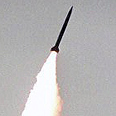
Russian general confirms Iran missile deal frozen
Allaying Israeli, American concerns, armed forces chief of staff confirms Moscow holding off delivery of air-defense missiles to Tehran because it violates UN sanctions; Italy seizes seven tons of explosives shipped from Iran to Syria
Russia will not deliver S-300 air-defense missiles to Iran, the armed forces chief of staff said on Wednesday, confirming a government decision to hold off on a deal that has deeply worried Washington and Israel.
General Nikolai Makarov said the delivery of the high-precision missiles would violate UN sanctions Moscow has supported, Russian news agencies reported.
"A decision was taken not to supply S-300s to Iran, they definitely fall under sanctions," Makarov was quoted as saying by state-run RIA.
The remarks were the first confirmation from a senior Russian official of Moscow's decision not to deliver the missiles, a sign of Russia's increasing willingness to join the West in putting pressure on Tehran over its nuclear program.
French officials had said that Prime Minister Vladimir Putin told French President Nicolas Sarkozy in June that Moscow would freeze the missile deal. Before that, Russian officials had made conflicting statements about whether new sanctions against Iran would prevent the sale.
The S-300 is a mobile, long-range air defense system that can detect, track and destroy ballistic missiles, cruise missiles and low-flying aircraft.
Iranian defiance irritates Kremlin
Iran announced a deal to acquire S-300s from Russia in 2007, and Russia has used it as a lever in diplomacy with Tehran and the West.
The United States and Israel, Iran's foes and rivals for predominance in the Middle East, have opposed the sale because it could give Iran the means to withstand air strikes aimed at knocking out its nuclear sites.
Russia's ties with Israel and the United States have been warming and the Kremlin has expressed irritation with Tehran's defiance of efforts to rein in its nuclear program.
Russia angered Israel and caused US concern by saying last week that it would go ahead with a $300 million sale of Yakhont anti-ship cruise missiles to Syria.
Russian officials have rejected Israeli concerns that the missiles could fall into the hands of Hezbollah guerrillas in neighboring Lebanon.
Also on Wednesday, Italian authorities have seized 7 tonnes of powerful RDX explosive apparently being shipped from Iran to Syria and believe that at least part of the cargo may have been intended for Italy, police sources said on Wednesday.
The cargo was found by anti-Mafia police in a shipping container in the southern port of Gioia Tauro.
They are still trying to ascertain whether the explosives were in Italy because the ship transporting them was making a technical stop, or whether part of the cargo was intended to be unloaded in the port.
RDX, also known as T4, is a powerful high explosive designed for military and industrial use.
- Follow Ynetnews on Facebook










